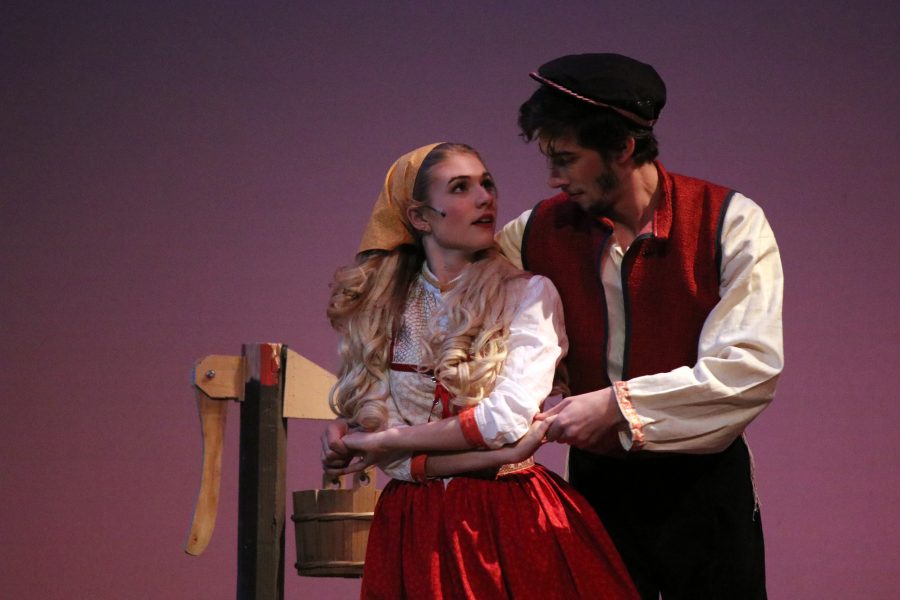Theatre Ink’s Fiddler on the Roof is a moving and relevant show, its success buoyed by a superb cast, an intricate set, and captivating choreography. The show transports the audience to Russia in the early 1900s, taking them on a journey of laughter and tears that will leave them with many deeper messages to ponder long after they leave.
Fiddler on the Roof is directed by Adam Brown and runs March 16-18 at 7:30pm and March 19 at 2pm in the auditorium.
The show starts with the song “Tradition.” The song introduces the people of the town of Anatevka, and the protagonist, Tevye, played by senior Nick Scott, a poor Jewish milkman who relies, like the rest of the town, on tradition to guide him. Scott delivers a powerful and thought-provoking performance as leading man.
The opening song is a whirl of color and talent that centers on the vibrant community of the town, a theme that appears throughout. The vivid and detailed costumes and the town’s rich traditions and rituals grab the audience’s attention and don’t let go.
“The audiences can look forward to a show that celebrates the lives of the people in the town of Anatevka,” said junior Anna Fischer, who plays one of Tevye’s daughters, Shprintze. “The show also looks at traditions, and how people challenge and change the traditions that they don’t like.”
Similarly, junior Rachel Stoia, who plays Anatevka’s matchmaker, Yente, said, “the show isn’t all laughs; it’s about breaking traditions and having to adjust to changes in life.”
In the song “Matchmaker,” Tevye’s three oldest daughters, Tzeitel, played by senior Olivia Duvall, Hodel, played by senior Liana Glennon, and Chava, played by junior Nora Geffen, demonstrate their connection to tradition as they discuss the matchmaker who will “find [them] a find.”
Hodel and Chava finally reach the conclusion that their “find” could set them up for a life of misery. The sisters, who dance around with brooms and watch tearfully as Tzeitel, the eldest, scares them by pretending to be the matchmaker, are perfectly suited to their roles. Their chemistry, combined with their full, rich voices, lets the audience witness an intimate moment that felt almost real.
Stoia as Yente the matchmaker is a star of the show with her heavy accent, hunchback, and talkative and insensitive personality.
“Each actor brings a part of themselves into their performance which makes it unique. Everyone plays their 1900s Anatevka self,” ,” said Stoia. “My character has a lot of comedic monologues which haven’t always been my strength in the past, and I’ve learned how to keep up the energy throughout all my scenes.”
The show continues with “If I Were a Rich Man,” during which Tevye muses about what he would do with his life if he were rich. He decides that he would spoil his wife, Golde, played by Isinsu Bastepe, and spend hours every day studying. Alone, Tevye leans against his cart and waves his arms as he wishes for a better life, some wishes absurd, others that make one’s heart ache for him.
A scene that returns to the theme of the importance of community and leaves the audience breathless is the song “Sabbath Prayer.” Tevye, Golde, and their daughters begin their Sabbath prayers at the dinner table. As they light their candles, other families at similar tables arrive. The numerous families light their candles together and the lights go out, leaving only the silhouettes of the cast and the haunting prayer that ties them all together.
While Tevye tries to stick to tradition, especially as he tries to marry off his daughters, his family has different ideas. Tevye’s rigid traditions must change or his daughters will become unhappy. Tevye’s inner battle sustains the show’s tension, and mirrors the changes occurring in the town.
Many people involved in the show could connect with it personally, including Brown, Stoia, and other cast members. These connections enhanced the authenticity of a show so reliant on character portraits.
Brown connected with the show through previous experience with it. He said that one of his favorite parts about directing the musical is “directing a show that has so much meaning to me personally, because I played the rabbi’s son and Tevye in college.” He added, “I’ve directed it before with kids and it relates to my own family background of my great-grandparents immigrating from Russia because of what was happening there in 1905.”
“I think many people in Newton have parents, grandparents, or great-grandparents who are immigrants, so this story hits close to home for a lot of us,” said freshman Dina Gorelik, who plays Bielke, Tevye’s youngest daughter.
“I relate to my character so much. Yente is literally every adult woman in my family. I’m Albanian so all my relatives have a very similar thick accent to the one I speak with when playing the role,” said Stoia.
In the current political climate, in which there are increasing sentiments of hatred and discrimination directed at Jews and immigrants, Fiddler on the Roof is a refreshing look at what both really are: people.
“It’s completely relative with what’s happening in the world because we’re talking about, throughout the world, refugees being forced out of their homes because of economics and politics,” said Brown. “They’re forced to leave their homes at a moment’s notice, like that line from Fiddler, and many of them have no place to go. And obviously, the anti-Semitism that’s happening throughout the country right now, not that it’s never happened, but it seems to be on the rise. Jews in Fiddler were looked at as outsiders and were constantly being moved or persecuted.”
After the marriages of Tzeitel, Hodel, and Chava overturn tradition, and the family’s relationships are changed forever, the show ends heartbreakingly, with the audience’s eyes opened to the realities of immigration and the struggles of the Jewish people.
However, according to Brown, it isn’t “just a Jewish musical — I think it’s a musical about people and what’s important in life,” said Brown.
The artistry of the production and the relevance of the themes of Fiddler on the Roof make the show a deeply touching experience.
Fiddler on the Roof reflects relevant political issues, showcases student talent
March 16, 2017
9
Donate to The Newtonite
More to Discover








































